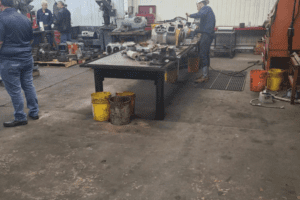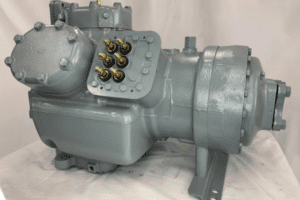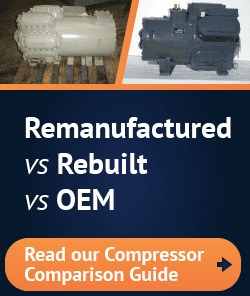Let’s face it: There’s never a perfect time to need to replace a commercial compressor.
But choosing the right time to do it can save thousands of dollars.
It wasn’t that long ago when the average commercial compressor only lasted about seven years before measurable efficiency losses were possible. These days, it’s easier to get a high level of performance out of your equipment for 8-10 years. Still, it’s crucial to have a compressor replacement plan in place.
As your equipment ages, even a few weeks of delay can make a difference.
The Big Risk Many Organizations Are Taking with Compressor Replacement
A replacement commercial compressor is a significant investment in the best of times.
If your business relies on an industrial refrigeration or HVAC system, compressor downtime can mean a full stoppage of important work. Yet, lots of companies are waiting longer than they should to develop a replacement plan. The culprit is in the price hikes striking the commercial compressor industry.
Although global supply chains are improving, it might surprise you to know that things haven’t reached a pre-pandemic point yet. Many shipping companies sold off unused vessels at the height of the disruption to control their costs. That means much less tonnage available for shipping today.
That’s not a big deal if you happen to have a compressor manufacturing plant in your backyard. But if your compressors are manufactured in another state or another country, you are affected. Even when completed compressors are trucked in from nearby, their components may still travel by sea.
As a result, even the best compressor companies are seeing their costs increase.
That’s causing many organizations to slam the brakes on compressor replacement, even when signs are glaring that they need to do it sooner rather than later. Early in a compressor’s life, it is not usually the cause of any major mechanical disruptions in the system. As years pass, though, the risk increases.
Many compressors are not designed for extensive field repairs, and if your compressor fails, you could be looking at spoilage or lost productivity in addition to delays in getting a replacement from your OEM.
Yet, even staring down that risk, the fact remains: Nobody wants to pay a 50% premium for a piece of equipment that’s already a major part of the budget. Luckily, you have an alternative. While prices of OEM compressors are rising quickly, the same can’t always be said about remanufactured commercial compressors.
How to Save More Money Replacing a Commercial Compressor
If you were already waiting for the day when a compressor would fit into your budget more effectively, the recent price increases are far from welcome news. We often say that a remanufactured commercial compressor can be 10%, 20%, 30%, or even less expensive compared to OEM, and the gap is growing.
While it’s not out of the ordinary for an OEM-affiliated wholesaler to charge 30% more than they did just 12 months ago, the same isn’t true in compressor remanufacturing. We’re also facing some cost pressure – but we’re more in the neighborhood of 5%-15% compared to 30% or more from an OEM distributor.
A trustworthy and established compressor remanufacturing team will still be able to get you a superior price on the equipment you need. As OEM-affiliated distributors continue to charge more, the gap is growing. Considering inflation, a remanufactured compressor is a more attractive deal today than last year.
What’s more, you can complete the process of sourcing your compressor much faster.
Choosing a compressor remanufacturer could cut hundreds or even thousands of miles off your personal supply chain. Plus, once you’ve got a strong relationship with your own remanufactured compressor supplier, it’s easier to obtain the spare parts your unit may need.
All in all, remanufacturing is the best way to control costs while maintaining quality.
If You Haven’t Used Compressor Remanufacturing in the Past, Now’s the Time
We know many organizations have stuck with OEM-affiliated distributors over the years because an “all-new” (but often remanufactured) compressor feels like a safer bet. In the long run, though, you’re paying extra for the brand name a distributor is associated with. The quality of a fully remanufactured compressor is identical.
In a true remanufacturing process, the unit is opened, cleaned, and inspected from top to bottom. Any component that’s not performing to specifications is replaced. At each step of the process, functions are tested in a specific order to ensure they meet your performance and environmental commitments.
Even better, in most cases remanufacturing uses your existing compressor core. This means you don’t have to wait for a new core to be fabricated, tested, shipped, and fully assembled; instead, the process can get underway fast. On top of everything else, this approach is the best for the environment, too.
To save money amid soaring prices, a remanufactured commercial compressor is a clear choice.












